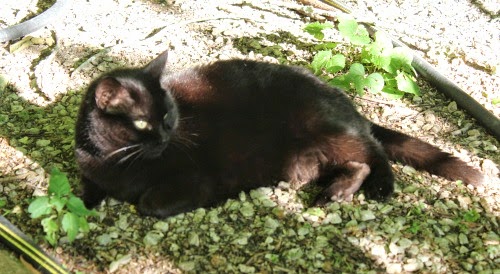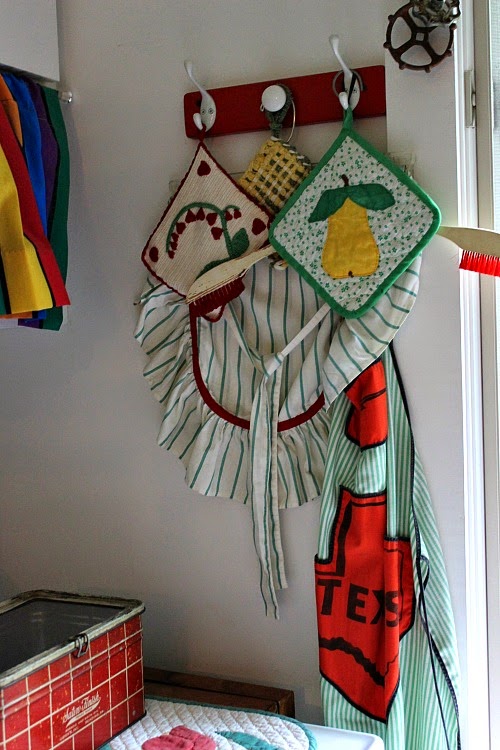Food memoirs are some of my favorite books, and none is a more satisfying read than Nora Seton's The Kitchen Congregation. Part of the book is about her mother, novelist Cynthia Propper Seton, who reminds me of another woman of her generation, my own mother.
Nora Seton writes:
"She was a good cook. People remember that about her.
Oh yes, yes, she wrote several novels, received acclaim,
battled cancer, raised five children.
But she was a good cook.
She was a good cook not because the feeding of a family of seven
plus routine entertaining and the importation of
odd sojourners into our house for months at a time
beat the basics into her.
She thought about it. She cared.
The edges of her intellect weren't blunted by the tedium."
Nora Seton's mother's hands may have been busy preparing the meals for her family, but her mind was busy developing the characters of her story or following thoughts that had nothing to do with cooking. But she believed that both cooking and writing were important, and she persistently pursued both. She was of the generation that primarily had been trained and expected to take care of husband and children.
"'That's what you did,' she would say,
referring to the era in which she was the girl child, not the mother,
and girls were channeled,
like small tributaries, into a common riverbed.
'That's what you did.'
You brought the proper mattresses, the right tablecloths.
You served coffee in the family silver.
You dressed for going outside. You behaved yourself."
"Behaving yourself meant cooking without grumbling, and doing it well.
We heard about other kitchens where mothers employed arsenals
of boxes and cans to placate empty bellies.
My mother arched her eyebrows when we described
sugary troves of soft pink things in friends' pantries, or meat in cans.
She couldn't duplicate it. Wouldn't.
"In my mother's kitchen, meals were constructed;
they didn't unfold from a seam.
It was a mark of pride that casseroles and cakes
were produced from scratch."
"And as the butter softened to room temperature,
she might dash upstairs to change the linens…
As the soup simmered, she might sit in the library disbursing checks.
As the dishes dried, as the roast sweated,
she would settle at her desk to write books and letters.
"She seemed to live in her kitchen,
making forays into other parts of the house and world.
She was there first thing in the morning,
a piece of the landscape in her fluffy quilted bathrobe,
making coffee, setting out ten slices of square bread,
top-bottom, top-bottom,
to make five sandwiches, plus ten cookies into five napkins,
plus five nickels for milk money, for five lunch boxes.
"That's what you did."
Nora Seton in The Kitchen Congregation
Yes, my own mother was of that generation and of that thought. "That's what you did." And Mama did. Somehow it all got done, every day. Mama did not write novels but she took sewing and tailoring classes and sewed exquisitely for four daughters.
And she read the novels that women like Nora Seton's mother wrote. Nor for her the chic lit of the day. She even read Tom Clancy's books when she was older and did not skip a single technical word. But then she also loved the Harry Potter books when she was older, always young at heart.
She and Dad hosted constant extended family dinners and not a dirty dish was left over for morning. There were chili suppers on Friday nights after the football games when my sisters and I brought friends home.
For my birthday present my junior year of high school she and my father planned a Hawaiian banquet complete with a whole pit-roasted pig, apple in its mouth.
[May 1960. Look for the red apple in pig's mouth in center.]
Daddy, as produce buyer for Nashville Kroger stores, was her partner in special events, sourcing the freshest produce available. I wish I remembered everything that Mama fixed for this luau, but I do remember her cutting up mounds of tropical fruit for the hollowed out pineapples for each plate. And I remember Daddy folding something up in green banana leaves on the shiny red Formica in the kitchen. I wonder what food that was? I'm sure the dessert must have been amazing as Mama's always were.
Most likely a lot of the work that went into this party for my friends and my boyfriend--yes, that was R.H.--went unappreciated by me or my guests. I sure do appreciate it now.
This is such a poor quality snapshot but that's R.H. on the left in the white clam digger pants and lots of leg showing. I'm beside him with the flower in my hair. Mama made my fitted Hawaiian sundress, no muumuu for me. Notice that all of us wore flower leis that Daddy had flown in from Hawaii.
R.H. said he remembers large seashells around the patio including one that was used as a trumpet. He said there were orchids on the table but I suspect my sister Deb is right and they were roses from Daddy's garden, which would have been blooming profusely then. Deb, four years younger than me says that she remembers how exciting all the preparations were and how beautiful the patio looked with torches burning around it. She says that she and our younger sisters Teresa and Jenn were bustled inside after my guests arrived.
I do remember there was a full moon--an artificial one. A round metal sledding disc was hung in the trees and fisherman's netting was strung around the patio. It was an enchanted evening while Songs of the Islands played through the screen windows via the stereo, and the game of the evening being The Limbo, of course. Every detail possible was planned to make the party memorable.
But that's what mothers (and fathers) did then, because "That's what you did."
Like Nora Seton, "When I miss my mother, I miss her in her kitchen." Like Seton, there were so many times in recent years when "I wanted to hear my mother sally across the kitchen floor humming Ella Fitzgerald songs while lugging a roast to the sink, with her back to me, the bow of her apron reminding me how she had made life practical and pretty at once."
When I read that last sentence of Seton's, I realize that most of my memories too are of watching my mother's back as she worked in her kitchen, moving from sink to counter to stove and back to sink again.
A husband, four daughters, later sons-in-law, grandchildren, great-grandchildren gathered around Mama's table. Aunts and uncles and cousins galore were often there. Old Air Force buddies and their wives visited. Church friends. Tables stretched to meet the need.
When I think of Mama I think of her moving through her household routines. Everything restored to its place, load after load of laundry, pegging out clothes on the line before a dryer finally came, standing at the ironing board while Stella Dallas played on the radio. Mama was a housewife even though later in life she sold sheets at Jordan Marsh and studied for and passed her real estate license exam. That didn't seem to effect how her house looked, houses that grew bigger and bigger through the years until they grew smaller. Houses that had shrunk just as Mama seemed to.
My mother and Nora Seton's mother may have wanted more for their own daughters than the life they had, may have hoped that their daughters would have satisfying careers other than that of being a housewife. But they might also have had sympathy for the new pressures of trying to be superwomen, working from morning until late bedtime, trying to keep it all together--work, family, house.
I know that my mother was so proud of her daughters who followed careers as well as taking excellent care of their family, just as I am constantly astounded at our daughter who went back for a degree after her children were in school and who does an amazing job in a fulfilling but demanding career and yet still plans family birthday parties, graduation parties, and holiday parties. And is never happier than when she can work all day in the kitchen concocting a family Thanksgiving feast of all her special dishes.
I don't know how women do all that and do it so well.
Maybe they got it from their mothers and grandmothers.
Because "That's what you did."
My mother and father in her kitchen above, grandchildren in the foreground.
Mama seems to be thinking…"You talking to me?"
Yes, Mama. I am.
[All the wonderful illustrations of the 1950s in this post, other than family photographs, were found on Pinterest and were not sourced so I can't give proper credit for them.]
[Update: My sisters confirm that Daddy did indeed cook the pig in a pit in our backyard. I guess I'll believe R.H. from now on! And sister Teresa added that Mama actually let her have a slumber party the night before my luau! Can you imagine? A houseful of 12 year old girls the night before the big party? But, "That's what you did." Thank you, Mama and Daddy, you were the best!]


















































